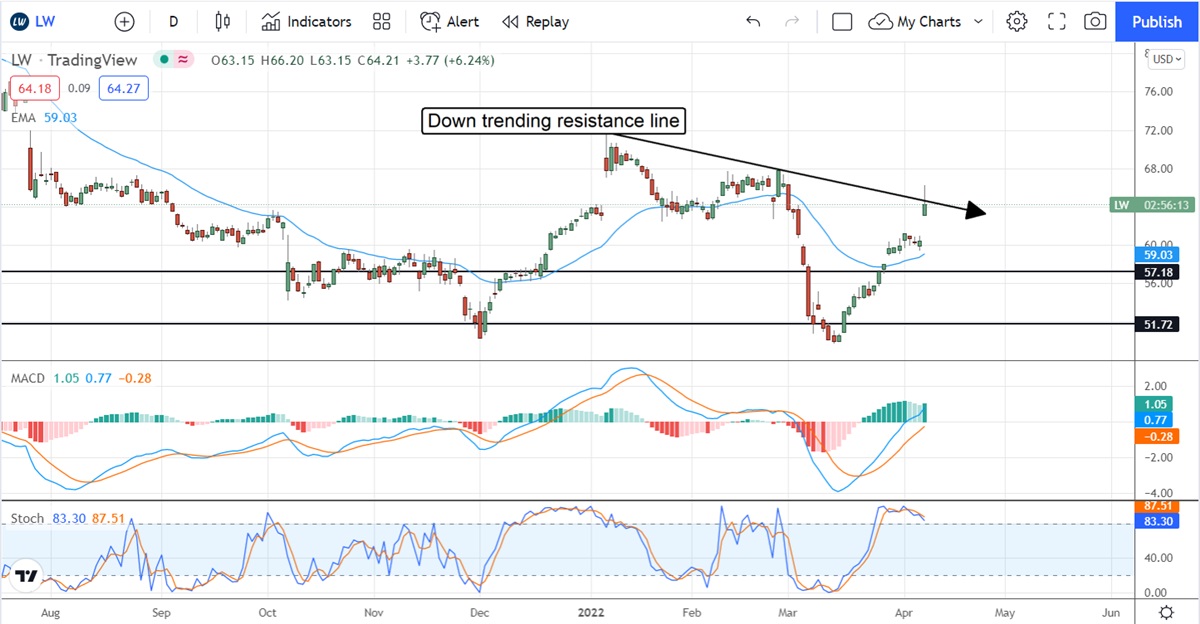Lamb Weston Rockets Higher On Earnings Strength
Lamb Weston (NYSE:LW) has been struggling with growth and it still is. The Q3 results were mixed at best and driven by pricing actions intended to offset the impacts of higher potato costs, higher freight costs, and systemic disruptions that are cutting into results. The good news is that margins and earnings are exceeding expectations and fueling the dividend. The bad news is we might be in a situation in which the company is robbing itself of future income. Conagra Brands reported a similar quarter minus the margin gains and reports volume sales are shrinking in the face of rising prices. Lamb Weston is one hot potato now but, trading at over 38X its earnings and yielding only 1.6%, we aren’t going to rush out to buy some.
Q4 2021 hedge fund letters, conferences and more
“We continued to make financial and operating progress in the quarter through strong execution of pricing actions to manage significant input, manufacturing and supply chain cost inflation,” said Tom Werner, President and CEO. “Our pricing actions, along with manufacturing productivity and cost mitigation efforts, drove sequential and year-over-year improvement in our gross margin despite the Omicron variant affecting demand across our restaurant and foodservice channels, and disrupting production and distribution operations more than we anticipated. In addition, constraints in global logistics networks continued to significantly limit our international sales volumes.”
Lamb Weston Grows Revenue On Pricing Action
Lamb Weston had a decent quarter considering the impact of Omicron on restaurant sales. The company reported $955 million for a gain of 7% over last year. The revenue missed the consensus by 180 basis points, however, despite pricing increases and continued strong demand from the at-home channels. The really bad news is that price/mix increased by 12% revealing a 5% decline in volume.
Moving down to the margins, the news gets better but is still driven by pricing actions. The company’s income from operations increased by 33% while the net income and earnings both grew by more than 60%. On the bottom line, the $0.73 in adjusted earnings is up 62% from last year and beat the Marketbeat.com consensus by $0.30.
Looking forward, the guidance is positive for both the top and bottom lines but, at the risk of sounding like a broken record, it’s because of pricing actions. The company is expecting revenue growth to come in above the high end of the long-term range of mid-single-digits with margins expanding to 19% to 20%.
Institutional Churn Drives Lamb Weston
The institutions are generally on board the Lamb Weston recovery as they hold over 90% of the stock. The activity over the past year or so has been net-bullish as well but just barely and it is driving volatility. The total institutional activity is worth about $4.8 billion or about 55% of the market cap but the balance of activity is closer to $0 billion than not. We expect to see this trend continue and to keep the price action range bound.
The Technical Outlook: Lamb Weston Is Range-Bound
Price action in Lamb Weston has been range-bound for the last few quarters and looks like it will stay that way in the near term at least. The post-release action is bullish but reveals the presence of resistance at the $65 level and below the last two tops. If this level confirms as resistance we see the stock moving back down to the bottom of the range where the valuation and yield make more sense.
Should you invest $1,000 in Lamb Weston right now?
Before you consider Lamb Weston, you'll want to hear this.
MarketBeat keeps track of Wall Street's top-rated and best performing research analysts and the stocks they recommend to their clients on a daily basis. MarketBeat has identified the five stocks that top analysts are quietly whispering to their clients to buy now before the broader market catches on... and Lamb Weston wasn't on the list.
While Lamb Weston currently has a "Buy" rating among analysts, top-rated analysts believe these five stocks are better buys.
Article by Thomas Hughes, MarketBeat






